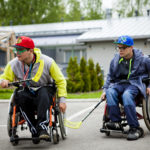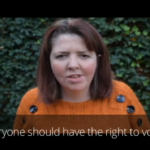“From the right to fair wages to the right to health care; from lifelong learning, a better work-life balance and gender equality to minimum income: with the European Pillar of Social Rights, the EU stands up for the rights of its citizens in a fast-changing world.”
– Jean Claude Juncker, President of the European Commission
On this page, you can read about the European Pillar of Social Rights.
What is the European Pillar of Social Rights?
The European Pillar of Social Rights defines 20 principles for the European Union to become more inclusive and fairer and to improve the lives of all European citizens. It was jointly approved by the European Parliament, the European Council and the European Commission in November 2017 which means all institutions of the European Union and all of its member states support the principles and rights expressed in the declaration.
The Pillar is divided into three chapters:

Equal opportunities and access to the labour market

Fair working conditions

Social protection and inclusion
You can find out more about:
How will the European Pillar of Social Rights benefit people with intellectual disabilities and their families?
The European Pillar of Social Rights specifically recognises the right of people with disabilities to inclusion (Principle 17):
People with disabilities have the right to income support that ensures living in dignity, services that enable them to participate in the labour market and in society, and a work environment adapted to their needs.
Other principles are relevant for persons with intellectual disabilities and their families, for example the right to:
- inclusive education and training and access to life-long learning opportunities (Principle 1);
- person-centred support and assistance for employment and self-employment (Principle 4);
- Fair and equal working conditions (Principle 5);
- fair wages (Principle 6);
- work-life balance (Principle 9);
- social protection (Principle 11);
- unemployment benefits (Principle 13);
- adequate minimum income (Principle 14);
- home-care and community-based services (Principle 18);
- social housing; (Principle 19);
- access to essential services, including water, sanitation, energy, transport, financial services and digital communication (Principle 20).
Social Affairs Commissioner Marianne Thyssen explaines the Social Pillar

Inclusion Europe and its members have been particularly active on some of the general principles of the European Pillar of Social Rights. They are presented in detail below. You can read all the principles of the European Pillar of Social Rights on the European Commission’s website. Alternatively, download this booklet.
Principle 1
Education, training and life-long learning
Everyone has the right to quality and inclusive education, training and life-long learning in order to maintain and acquire skills that enable them to participate fully in society and manage successfully transitions in the labour market.
Many adults with intellectual disabilities in Europe cannot participate as active citizens in their societies, since most have only limited access to formal or informal adult education and training, Read about Inclusion Europe’s work on inclusive education.
Learn more, for example, about our Topside project for training and peer training, as well as our involvement in the Inclusive Campus Life (ICLife) project on making universities more inclusive for students and employees with intellectual disabilities.
Many of our members also run projects to develop people’s skills and give them the opportunity to gain work experience, which will help them get paid jobs. One example is Mencap’s The Right Place project.

Principle 4
Active support to employment

Everyone has the right to timely and tailor-made assistance to improve employment or self-employment prospects. This includes the right to receive support for job search, training and re-qualification. Everyone has the right to transfer social protection and training entitlements during professional transitions. Young people have the right to continued education, an apprenticeship or traineeship, or a job offer of good standing within 4 months of becoming unemployed or leaving education. Unemployed people have the right to personalised, continuous and consistent support. The long-term unemployed have the right to an in-depth individual assessment at the latest at 18 months of unemployment.
Two of Inclusion Europe’s members, Pentru Voi (Romania) and Lebenshilfe (Austria), won prizes in 2017 for their projects promoting inclusion of people with disabilities into the labour market, through job coaching, skills enhancement training and partnerships with companies, or thanks to a cooperation between public institutions and private companies. One member in Spain, Plena Inclusión, also runs a project offering employment to people with complex support needs.
Fair working conditions
Principle 9
Work-life balance
Parents and people with caring responsibilities have the right to suitable leave, flexible working arrangements and access to care services. Women and men shall have equal access to special leaves of absence in order to fulfil their caring responsibilities and be encouraged to use them in a balanced way.
The Work-Life Balance Directive is one of the European Union’s initiatives to support workers with caring responsibilities. Inclusion Europe is advocating for a strong directive to be adopted, especially regarding carers’ leave. Read more
It is difficult for family carers to find work that allows them to meet their caring obligations. Family carers are too often in unstable employment, or not employed at all. This can lead to financial precarity. Parents of children with disabilities need support as parents and as carers to help find a balance between work and caring responsibilities.
Social protection and inclusion

Principle 11
Childcare and support to children

Children have the right to affordable early childhood education and care of good quality. Children have the right to protection from poverty. Children from disadvantaged backgrounds have the right to specific measures to enhance equal opportunities.
Children must receive as much support as necessary to be successfully included in mainstream schools and regular classes. Read about Inclusion Europe’s work on inclusive education and the recent study on the inclusion of pupils with complex support needs in mainstream schools.
Early childhood care is also essential for the development of children with disabilities. Find out about our member Plena Inclusión’s collaboration with the private sector to improve early care services of children with disabilities (in Spanish).
Principle 16
Health care
Everyone has the right to timely access to affordable, preventative and curative health care of good quality.
Persons with intellectual disabilities experience poorer health and healthcare than the rest of the general population. Many do not receive the right treatment or die from avoidable deaths, as due to lack of accessible quality healthcare and information. Read Inclusion Europe study on health and health toolkit, including recommendations and good practices such as Mencap’s campaign “Treat me well” The project SantéBD from CoActis Santé, developing free information materials in Easy-To-Read for persons with disabilities and health professionals, is a recent good initiative (in French, to be extended to other languages).

Principle 18
Long term care

Everyone has the right to affordable long-term care services of good quality, in particular home-care and community–based services.
Article 19 of the CRPD recognizes the right for persons with disabilities to live independently and be included in the community and explains the States must ensure that 1) persons with disabilities have the right to choose where and with whom to live; 2) that they access community support services, including personal assistance necessary to support living and inclusion in the community and; 3) that they must ensure equal access to community services and facilities as for the general population.
Inclusion Europe has developed, together with the European Network on Independent Living (ENIL), a factsheet on independent living for people with intellectual disabilities. Inclusion Europe is also part of the European Expert Group on the Transition from Institutional to Community-based Care. An Inclusion Europe also released in 2018 an analysis of the EU Council conclusion on Independent living.
The CRPD General Comment on article 51 states clearly that States must ensure no public or private are spent on maintaining, renovating, establishing building or creating any form of institution or institutionalization and that private institutions are not established under the guise of “community living”.
Principle 19
Housing
Access to social housing or housing assistance of good quality shall be provided for those in need. Vulnerable people have the right to appropriate assistance and protection against forced eviction. Adequate shelter and services shall be provided to the homeless in order to promote their social inclusion.
Article 19 establishes that States must ensure equal access to community services and facilities for people with disabilities as for the general population. This includes adequate housing that is accessible and affordable. Housing and housing assistance are needed also for those living in institutions to support their transition towards living independently in the community and ensure they are not forced to stay in institutions due to lack of choice or the dependence on family support. + Add link similar to long term care again. Have a look at Mencap project supporting persons with intellectual disabilities to make an informed decision about where and with whom they live and ensure they have access to the support they need to live independently in the community.

Principle 20
Access to essential services

The European Accessibility Act is one of the European Union’s initiatives to support workers with caring responsibilities. Article 19 CRPD establishes that States must ensure equal access to community services and facilities for people with disabilities as for the general population. It specifies that these non-disability-specific support services and facilities for the general population in the community must be available, universally accessible, acceptable and adaptable for all persons with disabilities within the community.
Everyone has the right to access essential services of good quality, including water, sanitation, energy, transport, financial services and digital communications. Support for access to such services shall be available for those in need.
In terms of accessibility of the information, Inclusion Europe has developed standards for easy to read and accessibility of meetings and recommendations for accessible elections.
How will the European Pillar of Social Rights be implemented and monitored?
Employment and social policies are mainly a competence of the member states. The European Commission can support the implementation of the Pillar. It can propose new laws and policies or update, complement and better enforce existing ones. One example for a new law is the Work-Life Balance Directive.
The current proposal of the European Commission for the EU budget (called Multiannual Financial Framework 2021-2027) aims to better align the Pillar of Social Rights and EU funding. It proposes the European Social Fund Plus (ESF+) as the main European financial instrument to implement and deliver on the principles of the Pillar of Social Rights. It merges different financial instruments under the ESF+ to pool the resources and better deliver on the Pillar of Social Rights.
The European Pillar of Social Rights will be monitored by the social scoreboard. It tracks member states’ development and progress in 12 policy areas covered by the Pillar. However, the social scoreboard does not include any indicators relevant to principle 17 on the inclusion of people with disabilities. It also lacks any data on other relevant categories, such as health or education. It furthermore does not provide disaggregated data on disability for the indicators and policy areas it covers. Inclusion Europe advocates for this to change as no evidence-based policies can be designed nor any meaningful monitoring of the social pillar achievements be done without disability-specific data.
Since 2018, the principles of the Pillar of Social Rights and the analysis provided by the social scoreboard are used for country reports and recommendations drafted by the European Commission in the context of the European Semester.
How can you use the European Pillar of Social Rights?

The European Pillar of Social Rights was approved by every member state of the European Union. This means every member state of the EU has committed to the Pillar’s policies and principles.
Therefore, you can use the European Pillar of Social Rights when advocating for better services and support in your home country. This may include access to health care, employment services, inclusive education and other areas.
The European Pillar of Social Rights may also be used when advocating for what should be the priorities of your national budget or of the EU budget.
The Pillar is very important for Inclusion Europe’s advocacy work as it relates to the themes of our strategy for the upcoming 5 years. The strategy will focus each year on a principal theme related to equal rights for and the inclusion of people with intellectual disabilities. The themes are: Empower, Elect, Educate, Employ, and End Segregation.
Inclusion Europe’s video: The 5 E’s – our strategy for the next five years
As part of this strategy, and in relation to social rights, Inclusion Europe will draft reports on the access to social benefit, minimum income, unpaid work, poverty, and on inclusive higher education.






